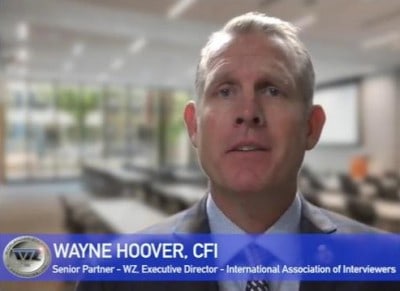Interview and Interrogation Training: The SWOT Method
This International Association of Interviewers interview and interrogation training tip provided by Wicklander-Zulawski, has Wayne Hoover, CFI discussing the SWOT analysis of the interview process.
SWOT stands for strengths, weaknesses, opportunities, and threats. Following this process provides the foundation for any good interviewing strategy.
We need to ask:
- What are our strengths? What information do we have that can best assist us during the interview?
- What are our weaknesses? We need to double-check everything. Is our investigation thorough enough?
- What opportunities do we have? Are there others involved? Who else is involved? How can we identify additional evidence during the interview to help with the case?
- What threats are we going to encounter? What will their strategy be? How will I counter that strategy?
By completing this process it gives us a clearer picture, and gives a more complete strategy to be successful during the interview. To watch the video, click here.
Interview and Interrogation Training: The Innocent’s Fear of Being Disbelieved
This International Association of Interviewers interview and interrogation training tip provided by Wicklander-Zulawski, has Dave Thompson, CFI discussing the innocent subject’s fear of being disbelieved.
When conducting an interview or interrogation, investigators attempt to analyze a subject’s behavior or attitude throughout the conversation. Often, a subject may appear anxious or fearful during the process and this person may be mislabeled as a “guilty” subject.
As Dave discusses in this video, it is important to recognize that the emotion of fear does not discriminate between innocent or guilty subjects. Both of these individuals may show varying levels of fear during an interview and that level of fear will most likely change as the conversation progresses. However, it is important that interviewers do not misread someone showing fear as someone being guilty. To watch the video, click here.
Interview and Interrogation Training: Why Do People Confess?
This International Association of Interviewers interview and interrogation training tip provided by Wicklander-Zulawski, has Wayne Hoover, CFI exploring the question, “Why do people confess?”
• Research shows that the top reasons are as follows:
• They believe that they’ve actually been caught.
• They believe that they’ll have the option and the opportunity to put their spin on the situation and why they did what they did.
• They just feel guilty and want to get it off their chest.
Know what these different reasons are can help you when you are preparing for an interview, and you will want to keep these reasons in mind when creating your interviewing strategy. To watch the video, click here.
Interview and Interrogation Training: The Agitated Interviewer
This International Association of Interviewers interview and interrogation training tip provided by Wicklander-Zulawski, has Dave Thompson, CFI discussing the effect of an interviewer becoming agitated or aggravated during an interview or interrogation.
David uses a supply and demand analogy to show how this can potentially impact the confession. If an interviewer becomes agitated, it clearly demonstrates to the subject that the interviewer is desperate for the confession; and as a result, this can make the confession more difficult to obtain.
When interviewers conduct a thorough investigation upfront, they are able to enter the interview with credibility rather than relying on a confession to complete their case. This will change our leverage during the conversation. In these cases, it should become clear to the subject that the interviewer does not desperately need the confession, which should make the confession easier to obtain. To watch the video, click here.
Interview and Interrogation Training: Leaving Subjects Alone
This International Association of Interviewers interview and interrogation training tip provided by Wicklander-Zulawski, has Wayne Hoover, CFI discussing leaving subjects alone in the interview room.
There are many interviewers that prefer to leave their subjects alone in the interview room prior to you walking into the room so they can think about what they’ve done, they can contemplate the consequences, or wonder who the interviewer is speaking with and what decisions are being made outside of the room.
Like anything, this might be a successful tactic in certain scenarios; however, it’s not something that we typically recommend. Remember how mad you were the last time you made a doctor’s appointment and were left in an exam room and were waiting 15 minutes after that appointment time you originally scheduled? We don’t want to make our subjects angry or upset before we even start the interview.
Any time that the subject is left alone they have an opportunity to plan for the conversation when you return; or potentially create a false alibi, hide evidence that might be on their person, or strengthen the resolve to deny their actions.
It’s usually a much better choice to call your subject into the room when you are ready to start the interview and remain with the subject until the interview is completed. To watch the video, click here.
Every loss prevention investigator should continuously strive to enhance their investigative interviewing skills as part of an ongoing commitment to best-in-class interviewing performance. This includes holding ourselves to an elite standard of interview and interrogation training that is ethical, moral and legal while demanding excellence in the pursuit of the truth. The International Association of Interviewers (IAI) and Wicklander-Zulawski (WZ) provide interview and interrogation training programs and additional guidance to investigators when dealing with dishonest employees, employee theft, sexual harassment, policy violations, building rapport, pre-employment interviewing, lying, denials and obtaining a statement.
By focusing on the latest information and research from experts in the field as well as academia, legal and psychological resources, these video tips provide interview and interrogation training techniques that can enhance the skill sets of professionals with backgrounds in law enforcement, loss prevention, security, asset protection, human resources, auditors or anyone looking to obtain the truth.
